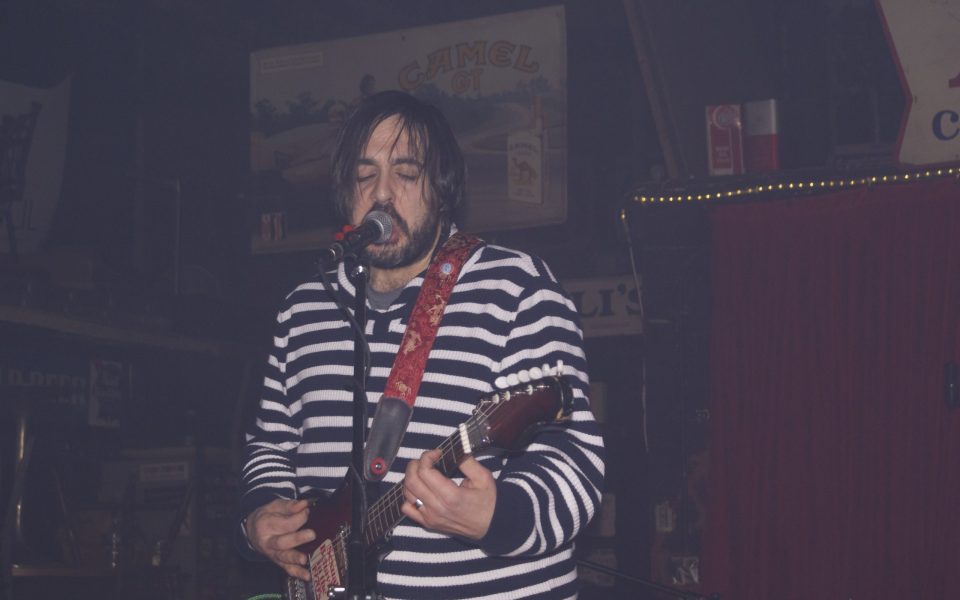by Anthony Harrison
The best bands form organically. As a happy consequence, a band’s sound, or lack thereof, also springs naturally.
Both 1970s Film Stock and Horizontal Hold, who played the Garage in Winston-Salem on Jan. 15, embody these ideals — bands that simply happened, and they play what they want, when they want.
Billed as “beardless, banjo-less spaz-pop,” Durham quarter Horizontal Hold took the stage a quarter after 10 p.m. Their first song put forward a slow, stilted intro featuring Dave Cantwell’s dirty, angular guitar and Kim Walker’s warm, chunky bass, with some atmospheric cymbal splashes and fills from drummer Elizabeth Hammond. They then launched into punky territory, with Kerry Cantwell’s deadpan vocals and droning synthesizer keeping the band from bouncing off the walls. But then, they swayed into a dreamy, ambient bridge before returning to driving punk.
Though referred to as “a super-group” of sorts, the band members laughed off the label.
“I feel like I’ve been in 20 bands with four people,” Dave Cantwell said.
Walker, a former Greensboro resident, volunteered to detail the band’s origin story.
“Dave and I knew each other, and I always admired his drumming. He’s known as a badass drummer,” Walker said. “I moved to Durham, so I was like, ‘Dude, can we play together?”
“And I admired her from afar as a bass player,” Dave Cantwell said. “Kim thought I was going to play drums, but I’d never played guitar in a band, so I decided to do that.”
Kerry Cantwell, Dave’s wife, joined as a synth player and vocalist, both of which she had never performed in a band setting. The group played in the Cantwells’ house for six months before discovering their “dream drummer” in Hammond.
“We all have elaborate musical histories,” Kerry Cantwell said.
“We all like different kinds of music,” Dave Cantwell added, “so that’s maybe where the schizophrenic nature comes from.”
A “painfully new song” towards the end of the set epitomized their schizoid, spaz-pop style. Beginning in waltz time with a melodic bassline and guitar arpeggios, the bridge shifted into a quintuple time — five beats per measure — before settling on four-on-the-floor, danceable punk.
En route to Athens, Ga., Horizontal Hold’s micro-tour stops include Atlanta and Greenville, SC, before looping back to Durham.
1970s Film Stock fired up next, and they were no less delightful in their shifting styles and sounds. Heavy yet bright, clear distortion from Eddie Garcia’s guitar and crashing cymbals and rolls from Ben Braxton’s drums seemed to set the tone, but the first song deceived the crowd. At the end of the song, as Garcia’s loop pedal filled the void, Garcia switched guitars and began playing clean, crispy power-pop chords.
Talk about a stylistic shift.
“I now have the ability to do anything, and I feel free about it,” the former Jews and Catholics guitarist Garcia said of his newest endeavor’s changes in form and sound. “Jews and Catholics satiated a certain thing, but only a few aspects of my creativity. Now, I can do anything and play my strengths.
“As long as we don’t go into a polka, we’re fine,” Garcia added with a chuckle.
Coincidentally, 1970s Film Stock’s origins also mirror Horizontal Hold’s genesis.
“I’d done some solo shows before Jews and Catholics ended,” Garcia said, “and Ben asked me to play his ‘end of year’ party in September. Then, I asked if he wanted to play with me.”
Braxton and Garcia had played together in the past.
“I’m sure I’ve got some weird four-track jams of us doing Neil Young covers when I was first learning drums,” Braxton said.
“We had one rehearsal, and it was fun,” Garcia said.
Reflecting his hopes to evolve, Garcia even realizes 1970s Film Stock can operate in different formats — solo performances, the two-piece which played that night or anything else.
“It’s great to have a non-committal thing,” Braxton said. “It’s great to have looseness — a little less structure and more rockin’.”
1970s Film Stock certainly does some rockin’. Their sounds morph from sludgy metal to indie-pop rock to dreamy ambient. Garcia uses pedals to layer riffs and process them into chirps, squeals and squawks. Their last song came on as ethereal, then featured a throttling breakdown reminiscent of the Velvet Underground’s “Sister Ray.”
“I just want to do whatever comes to me, approaching each song as what it should be,” Garcia said. “It’s freedom time.”
Join the First Amendment Society, a membership that goes directly to funding TCB‘s newsroom.
We believe that reporting can save the world.
The TCB First Amendment Society recognizes the vital role of a free, unfettered press with a bundling of local experiences designed to build community, and unique engagements with our newsroom that will help you understand, and shape, local journalism’s critical role in uplifting the people in our cities.
All revenue goes directly into the newsroom as reporters’ salaries and freelance commissions.



Leave a Reply